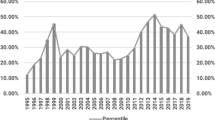Abstract
This paper examines theeffect of political competition in localelections in regional allocation of publicinvestment. The study employs data onMexican elections covering the period 1990–95, characterisedby an increase in electoral competition and coupled withincreasing demands for decentralisationthroughout the states. Empirical evidencesupports the hypothesis that regionalallocation of public investment by centralgovernment was driven by `politicalopportunism' and `local pork-barrelpolitics'. A positive relationship wasfound between the regional allocation ofpublic investment and support for thecentral ruling party. This might indicatethat local spending inefficiencies werepartially explained by the specific supportfor the incumbent party.
Similar content being viewed by others
References
Aguilar Camin, H. and Meyer, L. (1993). The shadow of the Mexican revolution: Contemporary Mexican history 1910–1989. University of Texas.
Alesina, A. and Tabellini, G. (1990). A positive theory of fiscal deficits and government debt.Review of Economic Studies 57: 403–414.
Alesina, A., Cohen, G.D. and Roubini, N. (1991). Macroeconomic policy and elections in OECD democracies. NBER Working Paper 3830. Cambridge, MA: NBER.
Banamex (1995). Data Bank, Economic Studies Department.
Bhargava, A.L., Franzini, L. and Narendranathan, W. (1982). Serial correlation and fixed effects model. Review of Economic Studies 49: 533–549.
Barro, R. and Gordon, D. (1983). Rules, discretion, and reputation in a model of monetary policy. Journal of Monetary Economics 12: 101–122.
Becker, G.S. (1983). A theory of competition among pressure groups for political influence. Quarterly Journal of Economics 98: 371–400.
Besley, T. and Case, A. (1993). Does electoral accountability affect economic policy choices? Evidence from gubernatorial term limits. NBER Working papers 4575. Cambridge, MA: NBER.
Besley, T. and Case, A. (1995). Incumbent behaviour: Vote-seeking, tax-setting, and yardstick competition. American Economic Review 85: 25–45.
Breton, A. (1996). Competitive governments: An economic theory of politics and public finance. University of Toronto.
Buchanan, J.M. and Wagner, R.E. (1977). Democracy in deficit. New York: Academic Press.
Coughlin, P. (1982). Expectations about voter choices. Public Choice 44: 49–59.
Coughlin, P. (1984). Elections and income redistribution. Public Choice: 50: 27–91.
Cukierman, A. (1992). Central Bank strategy, credibility and independence: Theory and evidence. Cambridge, MA: MIT Press.
Downs, A. (1957). An economic theory of democracy. New York: Harper and Row.
Enelow, J.M. and Hinich, M.J. (1984). The spatial theory of voting. Cambridge University Press.
Hibbs, D. (1977). Political parties and macroeconomic policy. The American political science review 71: 1467–1487.
Hibbs, D. (1987). The American political economy. Cambridge, MA: Harvard University Press.
Hirschman, A.O. (1958). The strategy of economic development. New Haven: Yale University Press.
Katz, I. (1986). Party government: Rationalistic conception. In Castles, F.G. and Wilderman, R. (Eds.), Visions and realities of party government. Berlin: de Gryteer.
Katz, I. (1999). La constitución y el desarrollo económico de México. Mexico City: Cal y Arena-CIDAC.
Kyland, F. and Prescott, E. (1977). Rules rather than discretion: The inconsistency of optimal plans. Journal of Political Economy 85: 473–492.
Lisomani, M. and Navarra, P. (2001). Local pork-barrel politics in national pre-election dates: The case of Italy. Public Choice 106: 317–326.
Loaeza, S. (1995). Context of Mexican policy. MIMEO.
Lujambio, A. (1995). Federalismo y congreso en el cambio político de México. UNAM: Instituto de Investigaciones Jurídicas).
Migué, J.L. (1997). Public choice in a federal system. Public Choice 90: 235–254.
Molinar, J. and Weldon, J. (1994). Electoral determinants and consequences of national solidarity.In Cornelius, N., Craig, A. and Fox, J. (Eds.), Transforming state-society relations in Mexico, the national solidarity strategy. San Diego: Center for US-Mexican Studies, University of California).
Mueller, D.C. and Murrell, P. (1986). Interest groups and the size of government. Public Choice 48: 125–145.
Musgrave, R. (1969). Fiscal systems. New Haven: Yale University Press.
Nordhaus, W. (1975). The political business cycle. The Review of Economic Studies 42: 169– 190.
Nordhaus, W. (1989). Alternative approaches to the political business cycle. Brooking Papers on Economic Activity 2: 1–68.
Oates, W. (1968). The theory of public finance in a federal system. Canadian Journal of Economics 1: 37–54.
Oates, W. (1990). Decentralization of the public sector: An overview. In Bennet, R. (Ed.), Decentralization, local governments and markets: Towards a post-welfare agenda?.Oxford.
Ordeshook, P.C. (1997). The spatial analysis of elections and committees: Four elections of research. In Mueller, D.C. (Ed.), Perspectives on public choice: A handbook, 247–270.Cambridge: Cambridge University Press.
Person, T. and Svensson, L. (1989). Why a stubborn conservative would run a deficit: Policy with time consistent preferences. Quarterly Journal of Economics 104: 325–345.
Petchey, J. (2000). Political competition and voter mobility. Public Choice 105: 231–243.
Rodriguez, V. (1999). Decentralization in Mexico, from reforma municipal to solidaridad to nuevo federalismo. Boulder: Westview Press.
Rodriguez-Oreggia, E. and Costa-Font, J. (2001). Desigualdades regionales e integracion económica: México y España. Comercio Exterior 51: 457–461.
Rogers, D.L. and Rogers, J.H. (2000). Political competition and state government size: Do tighter elections produce looser budgets?. Public Choice 105: 1–21.
Schumpeter, J. (1942). Capitalism, socialism and democracy. New York: Harper.
Stevens, J. (1993). The economics of collective choice. Boulder, Westview Press.
Tiebout, C. (1956). A pure theory of local expenditures. Journal of Political Economy 64: 416–424.
World Bank (1999). Beyond the center: Decentralizing the state. Washington, DC: World Bank Latin American and Caribbean Studies.
Author information
Authors and Affiliations
Rights and permissions
About this article
Cite this article
Costa-i-Font, J., Rodriguez-Oreggia, E. & Lunapla, D. Political Competition and Pork-Barrel Politics in the Allocation of Public Investment in Mexico. Public Choice 116, 185–204 (2003). https://doi.org/10.1023/A:1024263208736
Issue Date:
DOI: https://doi.org/10.1023/A:1024263208736




